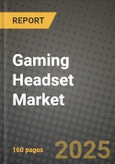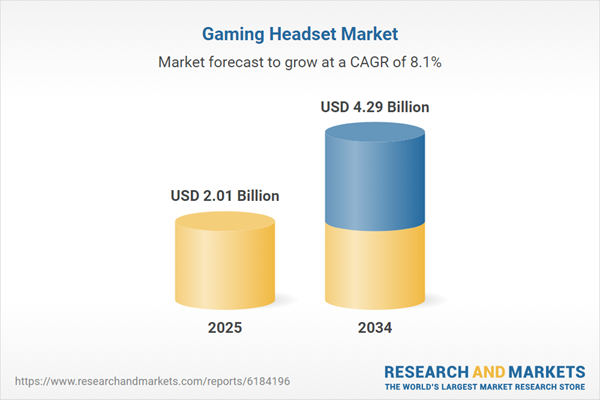Gaming Headset Market
The gaming headset market comprises wired USB/3.5 mm headsets, low-latency 2.4 GHz dongle models, Bluetooth multipoint SKUs, hybrid earbuds with boom/inline mics, and premium planar or dual-chamber dynamic designs. Core demand stems from PC/console multiplayer, esports and LAN events, livestreaming/creator workflows, mobile/cloud gaming, and crossover home-office use. Recent trends center on sub-40 ms end-to-end wireless paths, head-tracked spatial audio and personalized HRTFs, AI noise suppression for both mic and sidetone, and comfort-first industrial design (≤300 g, breathable pads, suspended bands). Battery strategies emphasize fast charge and week-long typical usage; software suites add per-title EQ, chat-mix, beam steering, and OTA updates with cloud profiles. Drivers include expanding live-service catalogs, social/competitive play, creator monetization, and platform features that expose per-game audio settings. The competitive landscape combines PC-peripheral majors, console-licensed brands, audio specialists entering gaming, ODM-led value lines, and boutique audiophile crossovers. Differentiation hinges on RF robustness in congested 2.4 GHz/BT environments, mic intelligibility in noisy rooms, clamp pressure and weight distribution over long sessions, and stable software that avoids CPU/GPU contention. Channel dynamics mix e-commerce, specialty retailers, and co-marketing with streamers and teams; limited editions and game tie-ins drive periodic refresh. Challenges include cross-platform licensing complexity, simultaneous support for PC/PlayStation/Xbox/Switch/mobile, counterfeit substitution in marketplaces, and proving step-up value versus headphones plus standalone USB/XLR mics. Vendors increasingly pursue sustainable materials, replaceable parts, and longer firmware support windows to reduce RMAs and strengthen brand equity.Gaming Headset Market Key Insights
- Wireless shifts to hybrid. 2.4 GHz dongle links for play + Bluetooth for calls/music with seamless switching; success depends on coexistence, quick device hopping, and >20-hour real-world endurance.
- Mic clarity is table stakes. Dual/quad beamforming plus AI denoise preserves consonants while muting keyboards and fans; hardware mute, sidetone control, and limiter/compander options reduce fatigue on long streams.
- Spatial audio maturity. Personalized HRTFs, head tracking, and per-title presets improve localization without harshness; calibration UX and safe-listening guardrails limit fatigue.
- Comfort is a spec, not a buzzword. Balanced clamping force, suspended bands, breathable/replaceable pads, and sub-300 g targets minimize hotspots for marathon sessions.
- Creator features expand TAM. Loopback/monitor mix, dual-PC routing, and clean USB audio class compliance bring entry-level studio capability without external mixers.
- Cross-platform simplicity wins. Single USB-C dongles with console auto-modes, chat-mix on PlayStation/Xbox, and mobile-ready low-latency codecs lower friction and returns.
- Materials and durability. Metal-reinforced yokes, rotation-tested hinges, braided or detachable cables, and sweat-resistant finishes reduce failures; modular batteries/pads extend lifecycle.
- Software as moat. Lightweight, stable apps with cloud profiles, OTA updates, and per-title EQ drive loyalty; bloat or crashes sink ratings quickly.
- Aesthetics with restraint. Subtle RGB, compact booms, and clean lines broaden appeal for hybrid work; detachable mics maintain social acceptability off-game.
- Sustainability and compliance. Recycled plastics, repairability, packaging reduction, and privacy-aware telemetry are now procurement and retailer checklist items.
Gaming Headset Market Reginal Analysis
North America
A large installed base across PC and consoles, strong esports ecosystems, and creator economies support premium wireless upgrades. Retail blends e-commerce, club stores, and brand sites; bundles with capture gear gain traction. Buyers prioritize low latency, RF stability in multi-device homes, and clear mics for open-plan spaces. Limited editions and team collabs drive seasonal refresh cycles.Europe
High console penetration and multi-language markets emphasize mic intelligibility, durable builds, and eco-design. Repairability, recycled materials, and compliant apps with transparent data handling influence listings. Competitive shooter communities prize accurate imaging and lightweight designs; retailers favor consolidated SKUs with true cross-platform support and CE documentation.Asia-Pacific
The largest gamer population spans PC cafés, mobile esports, and growing console niches. Fast product cycles drive demand from entry value to flagship planar/spatial models. Japan/Korea reward premium finish and reliability; China scales cost-optimized wireless and RGB aesthetics; Southeast Asia favors fold-flat portability and sweat-friendly pads for humid climates. Strong ties with e-commerce platforms are critical.Middle East & Africa
Broadband expansion, console growth, and mall-based gaming venues lift demand. Long battery life, heat-resistant materials, and robust 2.4 GHz links are favored for dense apartments. Specialty electronics and online marketplaces dominate distribution; experiential zones in retail and arenas accelerate premium adoption and brand awareness.South & Central America
Budget sensitivity steers volume to durable wired and entry-wireless models with clear chat and cross-platform dongles. Marketplaces and installment plans enable step-ups to premium SKUs. Local warranty support, spare-parts availability, and influencer partnerships matter; cafés and community arenas procure multi-unit fleets prioritizing durability and simple provisioning.Gaming Headset Market Segmentation
By Type
- Over-ear
- In-ear
By Application
- Personal Use
- Commercial Use
Key Market players
Logitech International S.A., Corsair Gaming, Inc., Razer Inc., SteelSeries ApS, Turtle Beach Corporation, HyperX (HP Inc.), Sennheiser electronic GmbH & Co. KG, ASUS (Republic of Gamers), Sony Interactive Entertainment LLC, Microsoft Corporation, Plantronics, Inc. (Poly), Cooler Master Technology Inc., PDP Gaming, Astro Gaming, Creative Technology Ltd.Gaming Headset Market Analytics
The report employs rigorous tools, including Porter’s Five Forces, value chain mapping, and scenario-based modelling, to assess supply-demand dynamics. Cross-sector influences from parent, derived, and substitute markets are evaluated to identify risks and opportunities. Trade and pricing analytics provide an up-to-date view of international flows, including leading exporters, importers, and regional price trends.Macroeconomic indicators, policy frameworks such as carbon pricing and energy security strategies, and evolving consumer behaviour are considered in forecasting scenarios. Recent deal flows, partnerships, and technology innovations are incorporated to assess their impact on future market performance.
Gaming Headset Market Competitive Intelligence
The competitive landscape is mapped through proprietary frameworks, profiling leading companies with details on business models, product portfolios, financial performance, and strategic initiatives. Key developments such as mergers & acquisitions, technology collaborations, investment inflows, and regional expansions are analyzed for their competitive impact. The report also identifies emerging players and innovative startups contributing to market disruption.Regional insights highlight the most promising investment destinations, regulatory landscapes, and evolving partnerships across energy and industrial corridors.
Countries Covered
- North America - Gaming Headset market data and outlook to 2034
- United States
- Canada
- Mexico
- Europe - Gaming Headset market data and outlook to 2034
- Germany
- United Kingdom
- France
- Italy
- Spain
- BeNeLux
- Russia
- Sweden
- Asia-Pacific - Gaming Headset market data and outlook to 2034
- China
- Japan
- India
- South Korea
- Australia
- Indonesia
- Malaysia
- Vietnam
- Middle East and Africa - Gaming Headset market data and outlook to 2034
- Saudi Arabia
- South Africa
- Iran
- UAE
- Egypt
- South and Central America - Gaming Headset market data and outlook to 2034
- Brazil
- Argentina
- Chile
- Peru
Research Methodology
This study combines primary inputs from industry experts across the Gaming Headset value chain with secondary data from associations, government publications, trade databases, and company disclosures. Proprietary modeling techniques, including data triangulation, statistical correlation, and scenario planning, are applied to deliver reliable market sizing and forecasting.Key Questions Addressed
- What is the current and forecast market size of the Gaming Headset industry at global, regional, and country levels?
- Which types, applications, and technologies present the highest growth potential?
- How are supply chains adapting to geopolitical and economic shocks?
- What role do policy frameworks, trade flows, and sustainability targets play in shaping demand?
- Who are the leading players, and how are their strategies evolving in the face of global uncertainty?
- Which regional “hotspots” and customer segments will outpace the market, and what go-to-market and partnership models best support entry and expansion?
- Where are the most investable opportunities - across technology roadmaps, sustainability-linked innovation, and M&A - and what is the best segment to invest over the next 3-5 years?
Your Key Takeaways from the Gaming Headset Market Report
- Global Gaming Headset market size and growth projections (CAGR), 2024-2034
- Impact of Russia-Ukraine, Israel-Palestine, and Hamas conflicts on Gaming Headset trade, costs, and supply chains
- Gaming Headset market size, share, and outlook across 5 regions and 27 countries, 2023-2034
- Gaming Headset market size, CAGR, and market share of key products, applications, and end-user verticals, 2023-2034
- Short- and long-term Gaming Headset market trends, drivers, restraints, and opportunities
- Porter’s Five Forces analysis, technological developments, and Gaming Headset supply chain analysis
- Gaming Headset trade analysis, Gaming Headset market price analysis, and Gaming Headset supply/demand dynamics
- Profiles of 5 leading companies - overview, key strategies, financials, and products
- Latest Gaming Headset market news and developments
Additional Support
With the purchase of this report, you will receive:- An updated PDF report and an MS Excel data workbook containing all market tables and figures for easy analysis.
- 7-day post-sale analyst support for clarifications and in-scope supplementary data, ensuring the deliverable aligns precisely with your requirements.
- Complimentary report update to incorporate the latest available data and the impact of recent market developments.
This product will be delivered within 1-3 business days.
Table of Contents
Companies Mentioned
- Logitech International S.A.
- Corsair Gaming Inc.
- Razer Inc.
- SteelSeries ApS
- Turtle Beach Corporation
- HyperX (HP Inc.)
- Sennheiser electronic GmbH & Co. KG
- ASUS (Republic of Gamers)
- Sony Interactive Entertainment LLC
- Microsoft Corporation
- Plantronics
- Inc. (Poly)
- Cooler Master Technology Inc.
- PDP Gaming
- Astro Gaming
- Creative Technology Ltd.
Table Information
| Report Attribute | Details |
|---|---|
| No. of Pages | 160 |
| Published | November 2025 |
| Forecast Period | 2025 - 2034 |
| Estimated Market Value ( USD | $ 2.01 Billion |
| Forecasted Market Value ( USD | $ 4.29 Billion |
| Compound Annual Growth Rate | 8.1% |
| Regions Covered | Global |
| No. of Companies Mentioned | 16 |









